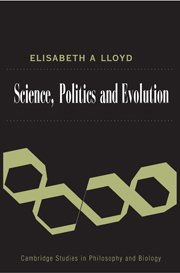Book contents
- Frontmatter
- Contents
- 1 The Nature of Darwin's Support for the Theory of Natural Selection
- 2 A Semantic Approach to the Structure of Population Genetics
- 3 Confirmation of Ecological and Evolutionary Models
- 4 Units and Levels of Selection
- 5 Species Selections on Variability
- 6 An Open Letter to Elliott Sober and David Sloan Wilson, Regarding Their Book, Unto Others: The Evolution and Psychology of Unselfish Behavior
- 7 Problems with Pluralism
- 8 Normality and Variation: The Human Genome Project and the Ideal Human Type
- 9 Evolutionary Psychology: The Burdens of Proof
- 10 Objectivity and the Double Standard for Feminist Epistemologies
- 11 Science and Anti-Science: Objectivity and Its Real Enemies
- 12 Pre-Theoretical Assumptions in Evolutionary Explanations of Female Sexuality
- References
- Index
1 - The Nature of Darwin's Support for the Theory of Natural Selection
Published online by Cambridge University Press: 27 February 2010
- Frontmatter
- Contents
- 1 The Nature of Darwin's Support for the Theory of Natural Selection
- 2 A Semantic Approach to the Structure of Population Genetics
- 3 Confirmation of Ecological and Evolutionary Models
- 4 Units and Levels of Selection
- 5 Species Selections on Variability
- 6 An Open Letter to Elliott Sober and David Sloan Wilson, Regarding Their Book, Unto Others: The Evolution and Psychology of Unselfish Behavior
- 7 Problems with Pluralism
- 8 Normality and Variation: The Human Genome Project and the Ideal Human Type
- 9 Evolutionary Psychology: The Burdens of Proof
- 10 Objectivity and the Double Standard for Feminist Epistemologies
- 11 Science and Anti-Science: Objectivity and Its Real Enemies
- 12 Pre-Theoretical Assumptions in Evolutionary Explanations of Female Sexuality
- References
- Index
Summary
DARWIN'S VIEWS
William Whewell and Sir John F. W. Herschel, the most influential writers in philosophy of science in the mid-nineteenth century, both held Newtonian physics aloft as the model form for a scientific theory. In order to demonstrate Darwin's sophistication concerning contemporary philosophical and methodological issues, I shall quote him extensively, in this section, from his private correspondence.
One crucial aspect of the laws of motion insisted on by philosophers and scientists alike was that they could be directly tested or proved. Darwin was well aware of the example provided by Newtonian physics, and was equally well aware that the theory of natural selection could not be tested by direct inference from the evidence.
When we descend to details, we can prove that no one species has changed [i.e. we cannot prove that a single species has changed]; nor can we prove that the supposed changes are beneficial, which is the groundwork of the theory. Nor can we explain why some species have changed and others have not.
(Darwin 1919, 2:210)On another occasion, Darwin wrote of F. W. Hutton:
He is one of the very few who see that the change of species cannot be directly proved, and that the doctrine must sink or swim according as it groups and explains phenomena. It is really curious how few judge it in this way, which is clearly the right way.
(1919, 2:155)Darwin explained his approach as follows:
I have always looked at the doctrine of natural selection as an hypothesis, which if it explained several large classes of facts, would deserve to be ranked as a theory deserving acceptance.
(1903, 1:139–140)- Type
- Chapter
- Information
- Science, Politics, and Evolution , pp. 1 - 19Publisher: Cambridge University PressPrint publication year: 2008



